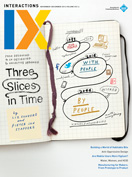Authors:
Carl DiSalvo
Last summer I had the opportunity to visit the Triennalle di Milano, an Italian design museum. One of the exhibitions was "Italian Design Beyond the Crisis: Autarky, Austerity, Autonomy," which proposed and examined the idea that economic crisis might generate creative designs. It included work from three decades: the 1930s, the 1970s, and the 2000s. The show was amazing, with an abundance of objects and material that helped make sense of the items individually and connected them in a stream of historical design practice inextricable from social and political context. It's cliché to say, but I left the exhibition…
You must be a member of SIGCHI, a subscriber to ACM's Digital Library, or an interactions subscriber to read the full text of this article.
GET ACCESS
Join ACM SIGCHIIn addition to all of the professional benefits of being a SIGCHI member, members get full access to interactions online content and receive the print version of the magazine bimonthly.
Subscribe to the ACM Digital Library
Get access to all interactions content online and the entire archive of ACM publications dating back to 1954. (Please check with your institution to see if it already has a subscription.)
Subscribe to interactions
Get full access to interactions online content and receive the print version of the magazine bimonthly.






